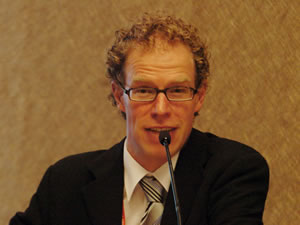Life, but not as we know it - Part 4
Friday 18 November 2011

Life, but not as we know it - Part 4

Tony Mohr, Manager Climate Change Campaigns - Australian Conservation Foundation
In our last installment of our special on climate change we hear from Tony Mohr from the Australian Conservation Foundation. Tony imparts his views on the science of climate change, how the Reef is affected by rising sea temperatures, and the carbon tax.
"There are really very, very few. 97% of climate change scientists agree that climate change is real, is occurring, and is caused by anthropogenic, or human released emissions.
"There are some non-climate change scientists who are doubtful about climate change science. (There are) some geologists and other kinds of scientists who are more sceptical or who straight out deny.
"There is a lot more agreement (that climate change is happening) than in a lot of other fields of scientific endeavour.
"Every bit of warming causes more frequent bleaching. It's not like it's at some particular temperature or some particular point that it all goes bad. It does get gradually bad as it gets warmer and warmer.
"If there was warming of more than two degrees, which could occur by 2070, 2100, or maybe even earlier if we don't tackle greenhouse gas emissions, you would get to that point where the bleaching (occurs) every year.
"Once that happens it's very hard for the reef to recover and you do get algal infestations from the dead coral.
"It is possible that some areas further south will become a little bit more conducive to coral.
"But the biggest problem there is that we're looking at quite fast changes to the ocean temperatures, and evolution and coral in particular don't build quickly. They take hundreds of years to develop into a fully-fledged reef.
"The changes are happening faster than what the coral can move.
"Coral bleaching doesn't happen all at once across the whole reef. That's partly because of ocean currents. Ocean currents can have quite a big impact on which areas get slightly warmer temperatures.
"Some reefs are already under stress. If they have a lot of nutrient content already, or if there are chemicals in the water, or if fish populations are already under stress, they're going to be more vulnerable to a temperature change.
"Bleaching isn't just a result of waters getting a little bit warmer. There's currents, there's latitudes, there are other pressures on the reef. That means you get a mixed response (bleaching levels).
"There is a lot of misinformation out there (on the Carbon Tax). The fact of the matter is that it will increase prices, but very small, we're looking at an average of a 0.7 per cent increase in the cost of goods and services.
"At the same time there is compensation for households, so there will be a lot lower impact than say the GST.
"We've heard from other countries; the US, China, and India, that what Australia is doing is making waves internationally. It's a big encouragement for countries that are already taking action to see that Australia is joining them.
"Countries like the US that haven't acted as quickly as we would like are coming under increasing pressure to lift there game as well.
"It does make quite a big global impact to make the big move, but for consumers it's not that big of a move at all.
"In a way, we're not aiming to change the behaviour of ordinary Australians in a big way. That's because this is an industrial problem. There are 500 companies who produce more than 60% of our national emissions.
"That's why we need an industrial solution to solve and industrial problem."
Have you checked out the region's best photo competition?
